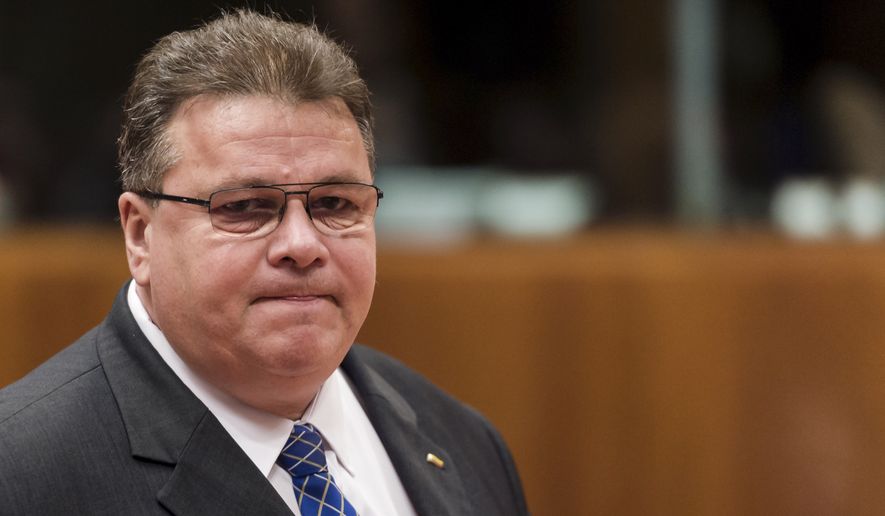Lithuanian Foreign Minister Linas Linkevicius warned Wednesday that the European Union will be losing one of its strongest voices standing up to Russian aggression following Britain’s vote last week to leave the 28-nation bloc.
In remarks at the Heritage Foundation, Mr. Linkevicius said that the Baltic state, which only gained its independence with the collapse of the Soviet Union in the early 1990s, would “love to keep close relations with the U.K.,” as Britain remains the strongest European ally in the face of growing assertiveness from Moscow along its western border with Europe.
But while the Brexit vote may have weakened the EU, the NATO military alliance should not be directly impacted and will retain a strong counter to Russia, the Lithuanian minister said.
Moscow “would be stupid to challenge NATO” through direct military action, he said, by he warned that the government of President Vladimir Putin has already begun to intervene in the Baltic region through “hybrid methods.”
Lithuanian Ambassador Rolandas Krisciunas also speculated that Russian propaganda throughout Europe was a possible cause of the triumph of the “Leave” forces in the U.K. referendum vote.
As one sign of Vilnius’ concern over its security situation, Mr. Linkevicius confirmed that Chief of Defense Jonas Vytautas Zukas plans to reinstate conscription in their country. The government has also published a manual for citizens to prepare them from possible armed conflict and occupation.
Lithuania is backing a more gradual and cautious divorce as Britain negotiates its withdrawal from the EU in the coming months, but pressure is growing from other EU powers, including France and Italy, that the separation talks be expedited.
Eastern European countries, who struggled long and hard to qualify for both the EU and NATO, have watched the Brexit process with growing dismay, fearful it may embolden Russia while giving more power to Paris and Berlin in internal EU debates.
Former Polish Foreign Minister Radek Sikorski, now a senior fellow at Harvard, said this week he believes Mr. Putin was “the happiest man in Europe” following the news that Britain voted to leave the European Union.
Mr. Sikorski, a longtime critic of Russia, said Britain’s departure “creates opportunities for Russia to play us off against one another.”
For their part, Russian officials say they are watching the EU developments closely, but say it is the West and NATO who are to blame for rising tensions in eastern Europe, through increased deployments and training exercises.
NATO has dramatically intensified the number of trainings near the Russian borders, Russian Defense Minister Sergei Shoigu said.
“The intensity of the trainings of the NATO armed forces conducted in direct vicinity of the Russian borders has more than doubled,” Defense Minister Sergei Shoigu told at a Russian Defense Ministry conference Wednesday on June 29.
“We do not rule out that, following NATO’s summit in Warsaw, the scope of the alliance’s military presence and military activity near Russian borders might grow significantly,” Mr. Shoigu said.
• Erica Brosnan can be reached at ebrosnan@washingtontimes.com.




Please read our comment policy before commenting.